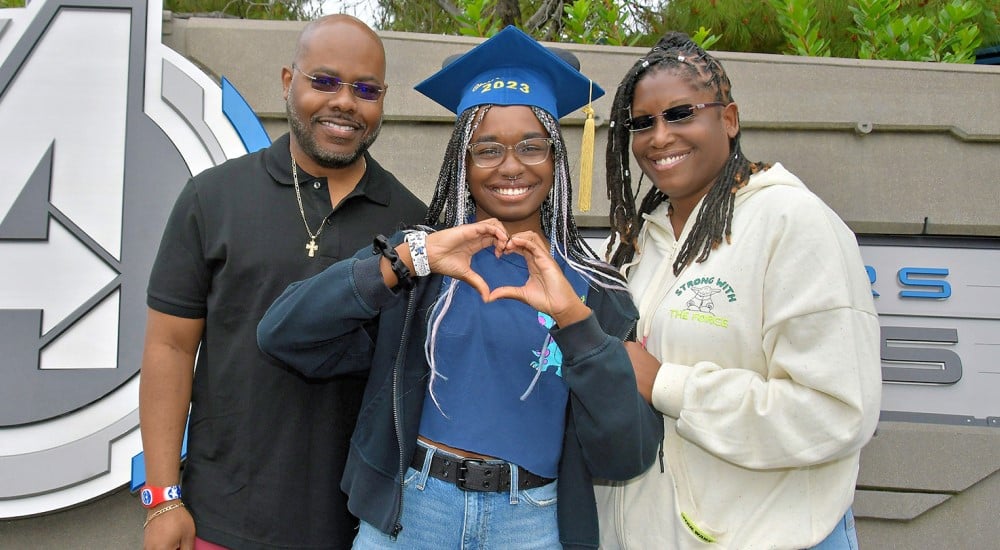This article by Kimberly Lankford originally appeared in the December 2023 issue of Military Officer, a magazine available to all MOAA Premium and Life members. Learn more about the magazine here; learn more about joining MOAA here.
Want to learn more about MOAA's transition resources? Download the 2024 edition of MOAA's Transition Guide, for free, today.
After spending a career in the military, it can be daunting and exciting to make the transition to the civilian world. You might only be in your 30s or 40s and have several decades before you fully retire, and you can finally decide where to go next.
“This is your opportunity to start thinking about what your personal passions are, what are the things that really motivate you,” said Lt. Col. Kitty Meyers, USAF (Ret), who worked her way up in Marriott Corp. after leaving the military and is now president of MOAA’s Alamo (Texas) Chapter (and a MOAA Life member) and a transition liaison.
“That helps you in figuring out where to live, what to do, and what kind of job to look for. Do a soul search, and figure out what’s important.”
[RELATED: MOAA's Transition and Career Resources]
Some people have a career in mind and move to the area where they’re offered the best job. Others choose the location first — either to be near family or because they’ve always wanted to live in that city — and then do their job search.
“It usually comes down to two choices: Do you want to live someplace specific and find a job, or do you want to find a job and then move to where that job is?” said Lt. Col. Joshua Andrews, USAF (Ret), CFP®, advice director for military life, investments, and education for USAA.
Andrews followed the job after he retired as an Air Force fighter pilot. “There were very few places that we were not wanting to go, simply because we had been stationed there and didn’t want to go back,” he said. “But we were looking for the best job in the career field.”

While still an active duty Air Force pilot, Lt. Col. Joshua Andrews pursued a master’s degree with military tuition assistance. (Courtesy photo)
While he was still on active duty, he took advantage of the military’s tuition assistance program to help pay for his master’s degree in financial planning, which was the course base for his certified financial planner (CFP) designation.
“Since the tuition assistance program has a two-year agreement, I was sure to stop two years prior to when I was thinking about leaving active duty,” he said. “I found a job at USAA and moved to San Antonio.” He finished his CFP certification — with financial help from the Post-9/11 GI Bill — while working at USAA and has lived in San Antonio ever since.
If you and your family start planning for the transition in advance, you can take advantage of special programs to help servicemembers find their next job.
Col. Shawn Walrath, USAF (Ret), a MOAA member, spent 25 years in Air Force intelligence, moving frequently and ending up at the Pentagon. When he was ready to retire from the military, his family was living in Annandale, Va., and their two sons were in high school.

Col. Shawn Walrath, USAF (Ret), here with wife Heather and their two sons, stayed in Northern Virginia after retiring from the military. (Photo by Trish Alegre-Smith)
He and his wife, Heather, had been looking forward to the time when they could choose to live wherever they wanted. They considered the cost of living, housing market, taxes, job opportunities, schools, community, and other factors when deciding where to go next.
In the end, they chose to stay in Northern Virginia for at least five more years, until their youngest son finishes his first year of college.
“They had friends, and we had a community,” said Heather Walrath. “There were tons of jobs here related to Shawn’s field. So suddenly we found ourselves thinking that Virginia would be a good place to end this chapter.”
As soon as they made that decision, Shawn Walrath could focus his job search on the National Capital Region. He applied to DoD’s SkillBridge program, which provides transitioning military members with an opportunity to gain civilian work experience through training programs, apprenticeships, or internships during their last 180 days of service. He worked with the U.S. Chamber of Commerce Foundation’s Hiring our Heroes program to find the internship and connect with a cohort of other servicemembers who were about to transition out of the military and were searching for civilian jobs.
Upcoming MOAA Transition and Career Events
He worked with AT&T’s Defense and National Security team in Chantilly, Va., for his internship — while he was being paid for his terminal leave — and was offered a job there after he retired from the Air Force on Jan. 1, 2023. He’s now a senior technical project manager for AT&T Public Sector.
Heather Walrath also took advantage of special programs for military spouses to help with her career. She was selected for FINRA Foundation’s Military Spouse Fellowship Program to earn her Accredited Financial Counselor certification in 2009 and has served as a personal financial counselor with all branches of the military. She worked remotely when her boys were young and then was a full-time financial counselor at Beale AFB, Calif.
After her husband was PCSed to the Pentagon, Heather Walrath found a job as a financial educator and military benefits liaison with Navy Mutual, a nonprofit veterans service organization, where she teaches financial education classes and provides financial counseling to survivors.
“It’s my dream role,” she said. That was another reason why they decided to stay in Northern Virginia for the next few years.
“I would encourage people to look at the initial phase of post-military life for three to five years. Plan for the first three to five years, get that going, then plan for the next set of years after that,” said Shawn Walrath. “There are going to be a lot of unknowns. Be patient with yourself and your spouse, and take advantage of the different resources that are available.”
[RELATED: Choose Progress Over Perfection]
Consider the following factors when deciding where to live after leaving the military and focusing your job search.
Explore the Possibilities
Several years before you leave the military, start thinking about your next phase. “I call it opening the aperture,” said Meyers. “Think about all the possibilities, then start narrowing it down to your passion, what you want to do, where you want to live, and how you want to live. Take those things into account, so that when you finally plant the flag somewhere, you’re going to be happy.”
She recommends getting the family involved in the brainstorming to think about where you want to live next.
“Take a blank piece of paper, and make a line down the middle and a line across — title one likes and dislikes. Put it on the refrigerator, put a pen near it, and let the whole family talk about it,” she said.
Compare the Cost of Living
When figuring out how much you need to make in your new job, you first need to calculate the value of the military benefits you need to replace. You’ll no longer have a tax-free housing allowance, and you’ll have to pay income taxes in the state where you actually live — which can be a new expense if you established residency in an income-tax-free state such as Florida or Texas while on active duty. If you are receiving military retirement pay, find out how the state taxes that money, too.
[RELATED: MOAA's Military State Report Card and Tax Guide]
But income taxes are just part of the picture.
“Many states have tax exemptions on military retirement pay, but [you] need to find out about property tax and income tax, too,” said Col. Brian Anderson, USAF (Ret), senior director for career transition and member services for MOAA. “Just because some states exempt [military retirement pay], doesn’t mean that they don’t make it up in other areas.”
Add the cost of health care — not just premiums, but also copays and deductibles. “When I was on active duty, those were nonissues,” said former Army Sgt. Mark Mitchell, a financial services representative with Equitable Advisors in San Clemente, Calif., who served for seven years in the Army in the late 1970s and early 1980s. “I didn’t learn about that until I became a civilian. Those are very important things to consider because they impact your budget.”
[RELATED: MOAA's TRICARE Guide]
Consider the cost of housing, all types of insurance — life, auto, homeowner’s — and other expenses that can vary by area.
“I suggest doing what I did: Write a chart of everything I was paying for while on active duty, and I did research in advance to find out what those equivalent services would be in the area that I was relocating to,” Mitchell said.
A job with a higher salary might not actually get you more depending on the location. “A $90,000 job in Tupelo, Miss., may look more attractive than a $120,000 job in Honolulu, Hawaii,” said Andrews. USAA has a calculator that helps you compare the cost of living by location, and the military’s Transition Assistance Program tools can help, too.
[RELATED: Financial Calculators From MOAA]
Family Considerations
Sometimes moving near family becomes the top priority, regardless of the cost of living — especially if you have young children or aging parents. Mitchell had to adjust to a big change in the cost of living when moving from Fort Sill, Okla., to Southern California to be near extended family who could help him and his wife with their newborn baby.
“It was going to cost more — not only because of the cost of services was higher,” he said, “but also because I didn’t have the supplements that were provided by the military.”
He took a job with Equitable Advisors in San Clemente, where he’s been for nearly 40 years.
Shay Cook, financial readiness manager for the FINRA Foundation, and her husband had been thinking about moving to North Carolina after he retired from the Air Force 15 years ago. “That [state] had a huge military presence,” she said. “But as the time got closer, we realized — [with] a young child — it was easier to be near parents who could help take care of her. Do you need a support system of family and friends? That needs to be a big part of the equation.”
They ended up moving close to family in Maryland. Cook completed the FINRA Foundation’s military spouse fellowship program in 2008, soon after her husband left the Air Force, and took a job as the financial readiness manager and then held other positions, including Army community service director at Walter Reed Army Medical Center in Washington, D.C. She then worked for Coast Guard headquarters before leaving the federal government for a contract position with the FINRA Foundation.

Shay Cook and her family moved to Maryland, where other family members lived, after her husband retired from the Air Force. (Courtesy photo)
Proximity to Military Bases and Resources
Some people are attracted to areas with military bases because of the resources and active military communities. There are several hubs of job opportunities for veterans, such as San Antonio; Pensacola and Tampa, Fla.; Seattle; the National Capital Region in Washington, D.C., Northern Virginia, and Maryland; San Diego; Hampton Roads, Va.; and Colorado Springs, Anderson said.
Cmdr. Jessie Kimber, USN (Ret), a MOAA member, retired from the Navy in 2022 and chose Colorado Springs as her home.
“I picked Colorado Springs because of its robust economy, which would greatly bolster my ability to find work post-retirement,” she said. “Additionally, I retired as a single parent, so a good support network was critical. Between my local family and the extensive veteran support organizations like Mt. Carmel [Veterans Service Center] and Homefront Military Network, I was completely covered.”

After retiring from the Navy, Cmdr. Jessie Kimber chose to move to Colorado Springs, Colo., in part because of the extensive support network it offered her family. (Courtesy photo)
Home to over 120,000 servicemembers — including active duty, Reserve, Guard, and veterans — and their families, Kimber says Colorado Springs was named as the No. 1 city in America where veterans succeed best in their post-military careers, largely because of the public-private partnerships that support veterans. Kimber now works to build those partnerships as the vice president of defense development for the Colorado Springs Chamber of Commerce and Economic Development Corp.
These cities often have jobs with military contractors that might be similar to the one you had in uniform. You can also benefit from having military health care, the PX, and commissary nearby. You might want to return to an area where you were stationed earlier in your career or stay near your last duty station.
Capt. Edward “Ed” Kruk, USN, a MOAA Life member, and his wife, Tanya, bought a house in Jacksonville, Fla., when he was assigned to a fleet helicopter squadron at Naval Station Mayport in the early 2000s. With the active military community, warm weather, and no state income tax, they always thought they’d return after he retired from the military.
“We really thought Florida was where we were going to end up because we had bought a house early on and kept it over the years,” Kruk said.
The Kruks moved 13 times during his military career, often every other year, and their oldest daughter had gone to nine different schools. Kruk was stationed in Hampton Roads, Va., when their two daughters were in middle school, then transferred to Pensacola.
The Navy asked where he would like to go as his next tour, which would probably be his last. “They offered San Diego, Washington, D.C., and Hampton Roads,” he said. Even though when he was starting his career he had hoped to be stationed on the West Coast, the couple decided not to move to California this time because it was expensive and they didn’t have any ties to the area.
They chose to return to Hampton Roads and live in Chesapeake, Va. “We knew the area and the neighborhood and the schools,” he said.

Capt. Edward Kruk, USN, and his wife, Tanya, shown here with their daughters, decided against a West Coast move after service. (Courtesy photo)
While in Chesapeake, their daughters graduated from high school and started college at Virginia in-state schools, and his transferred Post-9/11 GI Bill helped cover the cost. Their oldest daughter, Sophia, graduated from the College of William & Mary last year and moved to Richmond, and their younger daughter, Genevieve, just started at Virginia Tech.
“That was a strategic move because we knew that Virginia had a lot of good options for colleges if they were to go in-state,” said Kruk.
Now that he’s about to retire from the Navy, they decided to stay in the Hampton Roads area at least until Genevieve graduates from college.
“We want to do for our younger daughter what we did for the older one — provide some stability and a place to come home to during holidays and breaks. That was a big factor in our decision facing retirement to stay here and homestead for the next four to five years,” Kruk said.
After years of moving and having to work remotely, Tanya Kruk is now in an in-person job that she loves as a learning and development specialist at LifeNet Health, which does organ and tissue donation and research. “I really do like my job,” she said.
[RELATED: Timeless Transition Tips: 5 Ways to Master Your Career Path]
They’ll continue to rent out their house in Florida — they’ve been lucky to have the same tenants for 10 years. After a 30-year career that began at the U.S. Naval Academy, Ed Kruk is looking for jobs in the area and will likely work for a defense contractor.
“Hampton Roads has a huge amount of opportunity for retired military,” he said. “I’ll probably work on something similar to what I was doing in uniform. There’s a little bit of comfort to that.”
They might reassess their options in five years. “After that, we’ll see,” he said. “Florida may still be an option, but at that point, we will have been living in Virginia for 10 years, and the roots are starting to grow deeper and deeper.”
Moving With the Job
You don’t always choose the location first. Some people go where the best job offer takes them.
Meyers was a services officer during most of her five and half years on active
duty in the Air Force, spending most of her time in food services, and was looking for civilian careers that would use similar skills. She ended up getting a job as a food services supervisor for a company that runs cafeterias for businesses and schools — even though it might not have seemed like a step up. “I was a captain when I got out, and I became a food services supervisor,” she said.
[EXPAND YOUR NETWORK: MOAA Career Networking on LinkedIn]
Soon afterward, she became an assistant restaurant manager for Marriott, to get her foot in the door and learn the business at the international company. She moved up to be the director of restaurants at the hotel, followed by department head restaurant manager positions at two other Marriott hotels.
While she was finishing up her master’s degree in human resources (HR), Meyers became the director of HR at the Denver Marriott and then director of HR at the Dallas-Fort Worth Marriott. She spent 12 years working for Marriott in seven different hotels and 25 years as the director of HR at various companies before retiring to San Antonio. Now retired from the Air Force Reserve, too, she is the president of the Alamo Chapter of MOAA and helps people with their military transition.
She puts out a weekly eblast listing transition opportunities, job fairs, and networking events in San Antonio and Texas, and she’s a member of the San Antonio Chamber of Commerce’s military affairs committee, where she helps connect veterans with jobs in the area.
Take Advantage of Job-Search Resources
After you choose the location or the type of job, then you can focus your career search.
“Do your research. Who do you know in the new area? Have you connected with the MOAA chapter or the Chamber of Commerce? Start building the network even from afar,” said Meyers. “If you know the industry and companies, are you connecting on LinkedIn or doing phone call informational interviews to know if this is somewhere you want to go? Visit the city, take your spouse, and make it a family trip so everybody gets involved in the decision.”
Make the most of MOAA’s transition resources, which include a job board, transition guide, résumé reviews, career consulting, and transition events. Anderson recommends looking at the MOAA job board long before you’re ready to move so you can see the qualifications for the types of post military careers that interest you.
“It’s the perfect opportunity to reset,” said Anderson. “When you make your military-to-civilian transition, you can do anything you want.”
He also recommends checking out transition programs with DoD, the Department of Labor, and the U.S. Small Business Administration, which has Veteran Business Outreach Centers.
See who has won the Department of Labor’s Hire Vets Medallion Awards in the area you’re considering. “They give awards every year to employers that are military friendly and veteran friendly,” Anderson said. “They list those companies so you know some of the target companies that are really supportive of the military and veteran community.”
[RELATED: MOAA Recognized Again for Work to Hire and Retain Veterans]
Andrews recommends searching for the type of job or location at RecruitMilitary.com/usaa. “The goal is to connect military friendly employers with active duty members and spouses,” he said.
Meet people in the area you want to live. “Go to networking and veterans events, and you can even meet people at First Friday,” a monthly arts event in Colorado Springs, said Kimber. “You don’t have to wait for a stuffy job fair.”
Talk with anyone you know in the areas where you want to live. “You want to build and expand your network throughout your military career, so that when you end it, you already have those relationships built and some of that planning in place,” said Anderson.
Kimberly Lankford is a financial expert based in Virginia and the spouse of a retired Army colonel.
